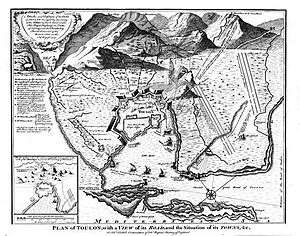Battle of Toulon (1707)
| Battle of Toulon | |||||||
|---|---|---|---|---|---|---|---|
| Part of the War of the Spanish Succession | |||||||
 | |||||||
| |||||||
| Belligerents | |||||||
|
|
| ||||||
| Commanders and leaders | |||||||
|
|
| ||||||
| Strength | |||||||
| 35,000 | 15,000 | ||||||
| Casualties and losses | |||||||
| 10,000 dead or wounded | |||||||
The Battle of Toulon was fought from 29 July to 21 August 1707 at Toulon, France during the War of the Spanish Succession. During the battle, a French and Spanish force defeated one from Austria, the Dutch Republic, Savoy and Great Britain.
In July 1707, Prince Eugene tried to take the French naval port of Toulon. Eugene had crossed the Var on the 11th, and – although hampered by the negligence and inefficiency of Victor Amadeus II of Savoy – had reached Fréjus. He was in touch with the British fleet under Admiral Shovell by the 16th. But Victor Amadeus' procrastination caused further delays, and gave time for the troops which the Duke of Berwick was sending home from Spain to reinforce Marshal René de Froulay de Tessé at Toulon before the arrival of the Allies (26 July).
On 14 August, Tessé retook the crucial heights of Santa Catarina, which the Allies had stormed a week earlier; and Eugene, finding his retreat menaced and little chance of taking Toulon, had to abandon his attempt (22 August), and fall back across the Var, having lost 10,000 men in this ill-fated enterprise. Shovell, before he evacuated, bombarded the French harbour and was able to sink two French ships of the line and damage severely two others.
The campaign's only fruit was that, in order to prevent their ships falling into the enemy's hands, the French had sunk their whole squadron of more than forty six ships of between fifty and 110 guns in the harbour. King Louis XIV gave orders that they be sunk and later be refloated. He was concerned that the Royal Navy would burn the ships; the three deckers would lie with only their upper decks showing above the water.[1] Much of the damage sustained, however, proved irreparable; it is estimated that the French Navy lost 15 ships of the line in this operation, thereby putting it quite out of its power to contest the English control of the Mediterranean.
References
- ↑ Holmes, pg 359
Bibliography
- Holmes, Richard. Marlborough: Britain's Greatest General: England's Fragile Genius, Harper Perennial, 2009 ISBN 0-00-722572-5
External links
Coordinates: 43°04′22″N 5°59′00″E / 43.07278°N 5.98333°E